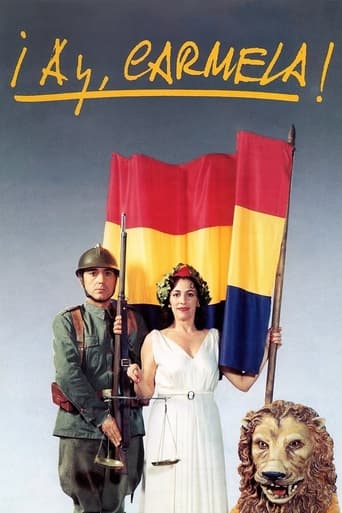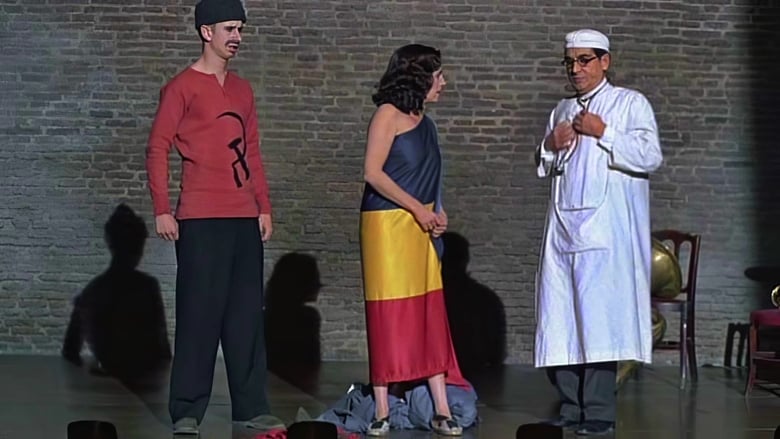

Ay, Carmela! (1990)
Paulino and Carmela are husband and wife, troubadours touring the countryside during the Spanish Civil War. They are Republicans, and with their mute assistant, Gustavete, they journey into rebel territory by mistake. They are arrested, fear a firing squad, and receive a reprieve from an Italian Fascist commander who loves the theatre. He arranges a performance for his troops, bargaining with Paulino to stage a burlesque of the republic in exchange for the actors' freedom. Will the fiery and patriotic Carmela consent?
Watch Trailer
Cast


Similar titles
Reviews
the audience applauded
Dreadfully Boring
Better Late Then Never
A different way of telling a story
I was only able to watch this beautiful movie recently, since the English subtitles appeared on the Internet. Pity it took someone so long to translate it. The film deals with the eternal dilemma of artists, torn apart between the urge to survive and to upheld some moral standards, in civil wars or during the enemy occupation. Under the skillful direction of Carlos Saura, all the actors performed superbly. The music is authentic and contemporary and sounds very convincing. After too many wars, the artist that entertained the enemy were often judged overly harshly. Not everybody is made to be a hero, and hunger is a very potent stimulant. The film is absolutely a must, but not for Fascist lovers, of course.
I think "Ay, Carmela" has a lot to offer in the way of understanding better the history of Spain and more specifically the Spanish Civil War. True, the characters are a bit underdeveloped, but not so much that one doesn't "care what happens:" The tension of the situation in Spain is clearly felt in the theater as Paulino and Carmela perform, and although we don't really get to know any of the characters very deeply, you can't help but feel the power of the tragedy as Carmela lies on the stage dying amidst the chaos. Furthermore, there is a lot of symbolism that a viewer would not get without having some knowledge of the Civil War and Franco's dictatorship, such as Carmela being buried -*outside*- of the cemetery in the middle of nowhere.
(spoilers) One of the things that I really like about this film is that its message can be delivered whether you know the situation in Spain at the time or not. The nationalists win violently at the end of the film, and you know the meaning of this without even having to know many historical details about the oppression of the Franco regime at the time that the movie takes place, which is important in making this movie internationally comprehensible. Carmela is a maternal figure both for her husband Paulino as well as for the young mute boy that they have taken into their care. They are entertainers seeking to escape the violence of the war, which is coming closer and closer to their home, but ultimately end up trying to entertain the Nationalist army and thereby win their freedom.There is a great scene at the beginning of the movie where Carmela and Paulino and Gustavete are performing for the rugged, less organized Republican army (sort of the roughnecks who have to defend themselves against the offenses of the Nationalists). This is a delightful performance that hugely entertains the audience, but it stops in its tracks as the sound of planes is heard overhead, and everyone in the room goes completely silent, waiting to hear the sound of bombs dropping. In this early scene, we see exactly what is going on in the film without having to have it delivered flatly through dialogue.We see the winners AND the losers in this film. The movie opens up with the performance for the Republicans, where everyone is having a good time including the performers, but by the end of the film, Carmela and Paulino and Gustavete have been captured and are nervously performing for the stolid Nationalist army, all the while terrified that they may say something wrong and offend the diminutive Franco in the front row (who reminds me of Lord Farquaad from Shrek) and be thrown back into prison or killed.The difference between the two armies is striking. The Republicans are clearly less organized, less trained, have less equipment, weapons, training, financial backing, etc, and most importantly, are very clearly there to defend themselves rather than wage war against the Nationalists. These are the peaceful people who are forced into a war situation by a regime that is about to attack them. The Nationalists, however, are a much more organized and well trained and funded group. They are, in fact, so organized, that the suits in the audience at the end of the film are literally color coded.The majority of the symbolism in the film is centered around Paulino, Carmela, and Gustavete. Carmela represents Spain, obviously, and her death at the end of the film represents the expiration of freedom and possibly the death of Spain itself. She tries to save everyone, worrying about the suffering of all people and therefore putting herself in danger in an effort to help them, while Paulino is much more realistic, concerned mostly with their own problems and saving themselves. He is not portrayed as selfish or as a coward, but as a realist. He knows that trying to fight against the Nationalists is simply not realistic and is a stupid way to get himself killed. Carmela died at the end of the film because she stood up against people that she had absolutely no power over.When Carmela is shot, Gustavete finally managed to get some sound out of his throat, representing a hope for the future. Carmela was killed, but Gustavete represents a new youth, and he has been given a voice by the display of violence put on by the Nationalist army, embodied in the one man who pulled the trigger. There is, however the fact that the Nationalists erupt into total confusion when things get rough at the end of the film, as well as the stunned look on the soldier's face when he realizes that he has killed Carmela, which shows that the movie is not about bad people, but about a bad ideology. The Nationalists are not portrayed as evil people, just people who made bad choices and got involved with a bad cause that did not turn out to be what they thought it was. This movie reminds me in a way of Life Is Beautiful (as does José Luis Cuerda's Butterfly), except that both the tragedy as well as the comedy are each reduced in each film. This is not a film about the power of stupid people in large groups, but rather the effect that a large idea can have on impressionable people. It warns against the dangers of being weak willed and simply going with the flow, the extremes that this kind of conformity can lead to. Clearly, this is a worst case scenario, but the film had a message that crosses time, culture, and international boundaries.
I only wanted to say that it was not until the second time that I watched it that I began to really appreciate the complexity of the story, is web of ironies, and the extent of the moral dilemmas with which the different characters really had to confront and deal with...and how in the end, it was really the lack of the husband's moral backbone that nearly bankrupted Carmela's (i.e, Spain's) morality and dignity...a dignity that was redeemed in the very end of the movie, but only through Carmela's very own blood - a very clear Christ-figure reference; one consistent with western literature, and also very consistent with much of the film's Communist/Republican/Atheist vs. Franco-Fascist/Vatican-Backed/Fervent Catholic sub plot.Carmen Maura was brilliant in the complex role of Carmela, as were the two male supporting actors in their respective roles. I only wish that the subtitles would have done the rich Spanish dialogue more justice. So many nuances had to be left out, but those I suppose are the limitations inherent in subtitles, no matter how competently they may be done.






